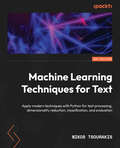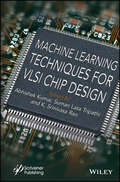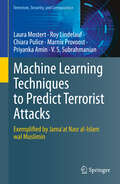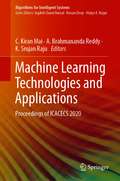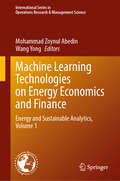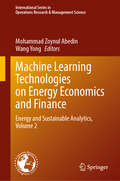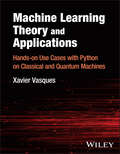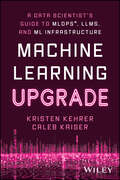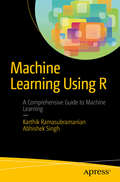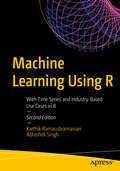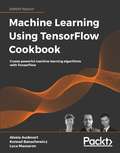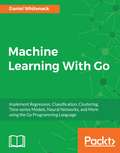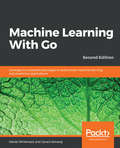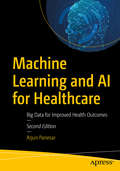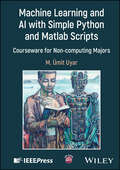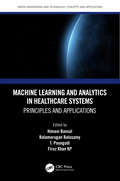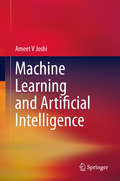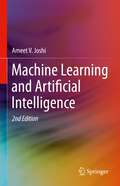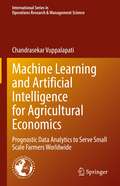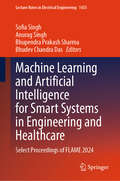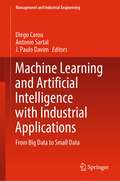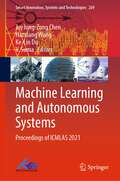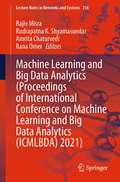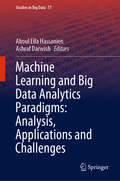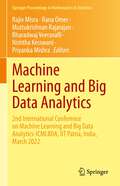- Table View
- List View
Machine Learning Techniques for Text: Apply modern techniques with Python for text processing, dimensionality reduction, classification, and evaluation
by Nikos TsourakisTake your Python text processing skills to another level by learning about the latest natural language processing and machine learning techniques with this full color guideKey FeaturesLearn how to acquire and process textual data and visualize the key findingsObtain deeper insight into the most commonly used algorithms and techniques and understand their tradeoffsImplement models for solving real-world problems and evaluate their performanceBook DescriptionWith the ever-increasing demand for machine learning and programming professionals, it's prime time to invest in the field. This book will help you in this endeavor, focusing specifically on text data and human language by steering a middle path among the various textbooks that present complicated theoretical concepts or focus disproportionately on Python code.A good metaphor this work builds upon is the relationship between an experienced craftsperson and their trainee. Based on the current problem, the former picks a tool from the toolbox, explains its utility, and puts it into action. This approach will help you to identify at least one practical use for each method or technique presented. The content unfolds in ten chapters, each discussing one specific case study. For this reason, the book is solution-oriented. It's accompanied by Python code in the form of Jupyter notebooks to help you obtain hands-on experience. A recurring pattern in the chapters of this book is helping you get some intuition on the data and then implement and contrast various solutions.By the end of this book, you'll be able to understand and apply various techniques with Python for text preprocessing, text representation, dimensionality reduction, machine learning, language modeling, visualization, and evaluation.What you will learnUnderstand fundamental concepts of machine learning for textDiscover how text data can be represented and build language modelsPerform exploratory data analysis on text corporaUse text preprocessing techniques and understand their trade-offsApply dimensionality reduction for visualization and classificationIncorporate and fine-tune algorithms and models for machine learningEvaluate the performance of the implemented systemsKnow the tools for retrieving text data and visualizing the machine learning workflowWho this book is forThis book is for professionals in the area of computer science, programming, data science, informatics, business analytics, statistics, language technology, and more who aim for a gentle career shift in machine learning for text. Students in relevant disciplines that seek a textbook in the field will benefit from the practical aspects of the content and how the theory is presented. Finally, professors teaching a similar course will be able to pick pertinent topics in terms of content and difficulty. Beginner-level knowledge of Python programming is needed to get started with this book.
Machine Learning Techniques for VLSI Chip Design
by Abhishek Kumar Suman Lata Tripathi K. Srinivasa RaoMACHINE LEARNING TECHNIQUES FOR VLSI CHIP DESIGN This cutting-edge new volume covers the hardware architecture implementation, the software implementation approach, the efficient hardware of machine learning applications with FPGA or CMOS circuits, and many other aspects and applications of machine learning techniques for VLSI chip design. Artificial intelligence (AI) and machine learning (ML) have, or will have, an impact on almost every aspect of our lives and every device that we own. AI has benefitted every industry in terms of computational speeds, accurate decision prediction, efficient machine learning (ML), and deep learning (DL) algorithms. The VLSI industry uses the electronic design automation tool (EDA), and the integration with ML helps in reducing design time and cost of production. Finding defects, bugs, and hardware Trojans in the design with ML or DL can save losses during production. Constraints to ML-DL arise when having to deal with a large set of training datasets. This book covers the learning algorithm for floor planning, routing, mask fabrication, and implementation of the computational architecture for ML-DL. The future aspect of the ML-DL algorithm is to be available in the format of an integrated circuit (IC). A user can upgrade to the new algorithm by replacing an IC. This new book mainly deals with the adaption of computation blocks like hardware accelerators and novel nano-material for them based upon their application and to create a smart solution. This exciting new volume is an invaluable reference for beginners as well as engineers, scientists, researchers, and other professionals working in the area of VLSI architecture development.
Machine Learning Techniques to Predict Terrorist Attacks: Exemplified by Jama'at Nasr al-Islam wal Muslimin (Terrorism, Security, and Computation)
by Roy Lindelauf V.S. Subrahmanian Chiara Pulice Laura Mostert Marnix Provoost Priyanka AminOne of the most influential actors in spreading Islamist violence across the Sahel is Jama&’at Nasr Al Islam Wal Muslimin (JNIM).This book provides the first systematic quantitative analysis of JNIM&’s behavior by analyzing a 12-year database of JNIM&’s attacks and the environment surrounding JNIM. This book leverages AI/ML predictive models to accurately predict almost 40 types of attacks using over 80 independent variables. This book describes a set of temporal probabilistic rules that state that when the environment in which the group operates satisfies some conditions, then an attack of a certain type will likely occur in the next N months. This provides a deep, easy to comprehend understanding of the conditions under which JNIM carries various kinds of attacks up to 6 months into the future. This book will serve as an invaluable guide to scholars (computer scientists, political scientists, policy makers). Military officers, intelligence personnel, and government employees, who seek to understand, predict, and eventually mitigate attacks by JNIM and bring peace to the nations of Mali, Burkina Faso, and Niger will want to purchase this book as well.
Machine Learning Technologies and Applications: Proceedings of ICACECS 2020 (Algorithms for Intelligent Systems)
by K. Srujan Raju C. Kiran Mai A. Brahmananda ReddyThis book comprises the best deliberations with the theme “Machine Learning Technologies and Applications” in the “International Conference on Advances in Computer Engineering and Communication Systems (ICACECS 2020),” organized by the Department of Computer Science and Engineering, VNR Vignana Jyothi Institute of Engineering and Technology. The book provides insights into the recent trends and developments in the field of computer science with a special focus on the machine learning and big data. The book focuses on advanced topics in artificial intelligence, machine learning, data mining and big data computing, cloud computing, Internet of things, distributed computing and smart systems.
Machine Learning Technologies on Energy Economics and Finance: Energy and Sustainable Analytics, Volume 1 (International Series in Operations Research & Management Science #367)
by Mohammad Zoynul Abedin Wang YongThis book explores the latest innovations in energy economics and finance, with a particular focus on the role of machine learning algorithms in advancing the energy sector. It examines key factors shaping this field, including market structures, regulatory frameworks, environmental impacts, and the dynamics of the global energy market. It discusses the critical application of machine learning (ML) in energy financing, introducing predictive tools for forecasting energy prices across various sectors—such as crude oil, electricity, fuelwood, solar, and natural gas. It also addresses how ML can predict investor behavior and assess the efficiency of energy markets, with a focus on both the opportunities and challenges in renewable energy and energy finance. This book serves as a comprehensive guide for academics, practitioners, financial managers, stakeholders, government officials, and policymakers who seek strategies to enhance energy systems, reduce costs and uncertainties, and optimize revenue for economic growth. This is the first volume of a two-volume set.
Machine Learning Technologies on Energy Economics and Finance: Energy and Sustainable Analytics, Volume 2 (International Series in Operations Research & Management Science #368)
by Mohammad Zoynul Abedin Wang YongThis book explores the latest innovations in energy economics and finance, with a particular focus on the role of machine learning algorithms in advancing the energy sector. It examines key factors shaping this field, including market structures, regulatory frameworks, environmental impacts, and the dynamics of the global energy market. It discusses the critical application of machine learning (ML) in energy financing, introducing predictive tools for forecasting energy prices across various sectors—such as crude oil, electricity, fuelwood, solar, and natural gas. It also addresses how ML can predict investor behavior and assess the efficiency of energy markets, with a focus on both the opportunities and challenges in renewable energy and energy finance. This book serves as a comprehensive guide for academics, practitioners, financial managers, stakeholders, government officials, and policymakers who seek strategies to enhance energy systems, reduce costs and uncertainties, and optimize revenue for economic growth. This is the second volume of a two-volume set.
Machine Learning Theory and Applications: Hands-on Use Cases with Python on Classical and Quantum Machines
by Xavier VasquesMachine Learning Theory and Applications Enables readers to understand mathematical concepts behind data engineering and machine learning algorithms and apply them using open-source Python libraries Machine Learning Theory and Applications delves into the realm of machine learning and deep learning, exploring their practical applications by comprehending mathematical concepts and implementing them in real-world scenarios using Python and renowned open-source libraries. This comprehensive guide covers a wide range of topics, including data preparation, feature engineering techniques, commonly utilized machine learning algorithms like support vector machines and neural networks, as well as generative AI and foundation models. To facilitate the creation of machine learning pipelines, a dedicated open-source framework named hephAIstos has been developed exclusively for this book. Moreover, the text explores the fascinating domain of quantum machine learning and offers insights on executing machine learning applications across diverse hardware technologies such as CPUs, GPUs, and QPUs. Finally, the book explains how to deploy trained models through containerized applications using Kubernetes and OpenShift, as well as their integration through machine learning operations (MLOps). Additional topics covered in Machine Learning Theory and Applications include: Current use cases of AI, including making predictions, recognizing images and speech, performing medical diagnoses, creating intelligent supply chains, natural language processing, and much more Classical and quantum machine learning algorithms such as quantum-enhanced Support Vector Machines (QSVMs), QSVM multiclass classification, quantum neural networks, and quantum generative adversarial networks (qGANs) Different ways to manipulate data, such as handling missing data, analyzing categorical data, or processing time-related data Feature rescaling, extraction, and selection, and how to put your trained models to life and production through containerized applications Machine Learning Theory and Applications is an essential resource for data scientists, engineers, and IT specialists and architects, as well as students in computer science, mathematics, and bioinformatics. The reader is expected to understand basic Python programming and libraries such as NumPy or Pandas and basic mathematical concepts, especially linear algebra.
Machine Learning Upgrade: A Data Scientist's Guide to MLOps, LLMs, and ML Infrastructure
by Kristen Kehrer Caleb KaiserA much-needed guide to implementing new technology in workspaces From experts in the field comes Machine Learning Upgrade: A Data Scientist's Guide to MLOps, LLMs, and ML Infrastructure, a book that provides data scientists and managers with best practices at the intersection of management, large language models (LLMs), machine learning, and data science. This groundbreaking book will change the way that you view the pipeline of data science. The authors provide an introduction to modern machine learning, showing you how it can be viewed as a holistic, end-to-end system—not just shiny new gadget in an otherwise unchanged operational structure. By adopting a data-centric view of the world, you can begin to see unstructured data and LLMs as the foundation upon which you can build countless applications and business solutions. This book explores a whole world of decision making that hasn't been codified yet, enabling you to forge the future using emerging best practices. Gain an understanding of the intersection between large language models and unstructured data Follow the process of building an LLM-powered application while leveraging MLOps techniques such as data versioning and experiment tracking Discover best practices for training, fine tuning, and evaluating LLMs Integrate LLM applications within larger systems, monitor their performance, and retrain them on new data This book is indispensable for data professionals and business leaders looking to understand LLMs and the entire data science pipeline.
Machine Learning Using R
by Karthik Ramasubramanian Abhishek SinghExamine the latest technological advancements in building a scalable machine learning model with Big Data using R. This book shows you how to work with a machine learning algorithm and use it to build a ML model from raw data. All practical demonstrations will be explored in R, a powerful programming language and software environment for statistical computing and graphics. The various packages and methods available in R will be used to explain the topics. For every machine learning algorithm covered in this book, a 3-D approach of theory, case-study and practice will be given. And where appropriate, the mathematics will be explained through visualization in R. All the images are available in color and hi-res as part of the code download. This new paradigm of teaching machine learning will bring about a radical change in perception for many of those who think this subject is difficult to learn. Though theory sometimes looks difficult, especially when there is heavy mathematics involved, the seamless flow from the theoretical aspects to example-driven learning provided in this book makes it easy for someone to connect the dots. . What You'll Learn Use the model building process flow Apply theoretical aspects of machine learning Review industry-based cae studies Understand ML algorithms using R Build machine learning models using Apache Hadoop and Spark Who This Book is For Data scientists, data science professionals and researchers in academia who want to understand the nuances of machine learning approaches/algorithms along with ways to see them in practice using R. The book will also benefit the readers who want to understand the technology behind implementing a scalable machine learning model using Apache Hadoop, Hive, Pig and Spark.
Machine Learning Using R
by Karthik Ramasubramanian Abhishek SinghExamine the latest technological advancements in building a scalable machine-learning model with big data using R. This second edition shows you how to work with a machine-learning algorithm and use it to build a ML model from raw data. You will see how to use R programming with TensorFlow, thus avoiding the effort of learning Python if you are only comfortable with R.As in the first edition, the authors have kept the fine balance of theory and application of machine learning through various real-world use-cases which gives you a comprehensive collection of topics in machine learning. New chapters in this edition cover time series models and deep learning.What You'll Learn Understand machine learning algorithms using RMaster the process of building machine-learning models Cover the theoretical foundations of machine-learning algorithmsSee industry focused real-world use casesTackle time series modeling in RApply deep learning using Keras and TensorFlow in RWho This Book is ForData scientists, data science professionals, and researchers in academia who want to understand the nuances of machine-learning approaches/algorithms in practice using R.
Machine Learning Using TensorFlow Cookbook: Over 60 recipes on machine learning using deep learning solutions from Kaggle Masters and Google Developer Experts
by Luca Massaron Alexia Audevart Konrad BanachewiczMaster TensorFlow to create powerful machine learning algorithms, with valuable insights on Keras, Boosted Trees, Tabular Data, Transformers, Reinforcement Learning and moreKey FeaturesWork with the latest code and examples for TensorFlow 2Get to grips with the fundamentals including variables, matrices, and data sourcesLearn advanced deep learning techniques to make your algorithms faster and more accurateBook DescriptionThe independent recipes in Machine Learning Using TensorFlow Cookbook will teach you how to perform complex data computations and gain valuable insights into your data. You will work through recipes on training models, model evaluation, sentiment analysis, regression analysis, artificial neural networks, and deep learning - each using Google's machine learning library, TensorFlow. This cookbook begins by introducing you to the fundamentals of the TensorFlow library, including variables, matrices, and various data sources. You'll then take a deep dive into some real-world implementations of Keras and TensorFlow and learn how to use estimators to train linear models and boosted trees, both for classification and for regression to provide a baseline for tabular data problems. As you progress, you'll explore the practical applications of a variety of deep learning architectures, such as recurrent neural networks and Transformers, and see how they can be applied to computer vision and natural language processing (NLP) problems. Once you are familiar with the TensorFlow ecosystem, the final chapter will teach you how to take a project to production. By the end of this machine learning book, you will be proficient in using TensorFlow 2. You'll also understand deep learning from the fundamentals and be able to implement machine learning algorithms in real-world scenarios.What you will learnGrasp linear regression techniques with TensorFlowUse Estimators to train linear models and boosted trees for classification or regressionExecute neural networks and improve predictions on tabular dataMaster convolutional neural networks and recurrent neural networks through practical recipesApply reinforcement learning algorithms using the TF-Agents frameworkImplement and fine-tune Transformer models for various NLP tasksTake TensorFlow into productionWho this book is forIf you are a data scientist or a machine learning engineer, and you want to skip detailed theoretical explanations in favor of building production-ready machine learning models using TensorFlow, this book is for you.Basic familiarity with Python, linear algebra, statistics, and machine learning is necessary to make the most out of this book.
Machine Learning With Go
by Daniel WhitenackBuild simple, maintainable, and easy to deploy machine learning applications. About This Book • Build simple, but powerful, machine learning applications that leverage Go's standard library along with popular Go packages. • Learn the statistics, algorithms, and techniques needed to successfully implement machine learning in Go • Understand when and how to integrate certain types of machine learning model in Go applications. Who This Book Is For This book is for Go developers who are familiar with the Go syntax and can develop, build, and run basic Go programs. If you want to explore the field of machine learning and you love Go, then this book is for you! Machine Learning with Go will give readers the practical skills to perform the most common machine learning tasks with Go. Familiarity with some statistics and math topics is necessary. What You Will Learn • Learn about data gathering, organization, parsing, and cleaning. • Explore matrices, linear algebra, statistics, and probability. • See how to evaluate and validate models. • Look at regression, classification, clustering. • Learn about neural networks and deep learning • Utilize times series models and anomaly detection. • Get to grip with techniques for deploying and distributing analyses and models. • Optimize machine learning workflow techniques In Detail The mission of this book is to turn readers into productive, innovative data analysts who leverage Go to build robust and valuable applications. To this end, the book clearly introduces the technical aspects of building predictive models in Go, but it also helps the reader understand how machine learning workflows are being applied in real-world scenarios. Machine Learning with Go shows readers how to be productive in machine learning while also producing applications that maintain a high level of integrity. It also gives readers patterns to overcome challenges that are often encountered when trying to integrate machine learning in an engineering organization. The readers will begin by gaining a solid understanding of how to gather, organize, and parse real-work data from a variety of sources. Readers will then develop a solid statistical toolkit that will allow them to quickly understand gain intuition about the content of a dataset. Finally, the readers will gain hands-on experience implementing essential machine learning techniques (regression, classification, clustering, and so on) with the relevant Go packages. Finally, the reader will have a solid machine learning mindset and a powerful Go toolkit of techniques, packages, and example implementations. Style and approach This book connects the fundamental, theoretical concepts behind Machine Learning to practical implementations using the Go programming language.
Machine Learning With Go: Leverage Go's powerful packages to build smart machine learning and predictive applications, 2nd Edition
by Daniel Whitenack Janani SelvarajInfuse an extra layer of intelligence into your Go applications with machine learning and AIKey FeaturesBuild simple, maintainable, and easy to deploy machine learning applications with popular Go packagesLearn the statistics, algorithms, and techniques to implement machine learningOvercome the common challenges faced while deploying and scaling the machine learning workflowsBook DescriptionThis updated edition of the popular Machine Learning With Go shows you how to overcome the common challenges of integrating analysis and machine learning code within an existing engineering organization.Machine Learning With Go, Second Edition, will begin by helping you gain an understanding of how to gather, organize, and parse real-world data from a variety of sources. The book also provides absolute coverage in developing groundbreaking machine learning pipelines including predictive models, data visualizations, and statistical techniques. Up next, you will learn the thorough utilization of Golang libraries including golearn, gorgonia, gosl, hector, and mat64. You will discover the various TensorFlow capabilities, along with building simple neural networks and integrating them into machine learning models. You will also gain hands-on experience implementing essential machine learning techniques such as regression, classification, and clustering with the relevant Go packages. Furthermore, you will deep dive into the various Go tools that help you build deep neural networks. Lastly, you will become well versed with best practices for machine learning model tuning and optimization.By the end of the book, you will have a solid machine learning mindset and a powerful Go toolkit of techniques, packages, and example implementationsWhat you will learnBecome well versed with data processing, parsing, and cleaning using Go packagesLearn to gather data from various sources and in various real-world formatsPerform regression, classification, and image processing with neural networksEvaluate and detect anomalies in a time series modelUnderstand common deep learning architectures to learn how each model is builtLearn how to optimize, build, and scale machine learning workflowsDiscover the best practices for machine learning model tuning for successful deploymentsWho this book is forThis book is primarily for Go programmers who want to become a machine learning engineer and to build a solid machine learning mindset along with a good hold on Go packages. This is also useful for data analysts, data engineers, machine learning users who want to run their machine learning experiments using the Go ecosystem. Prior understanding of linear algebra is required to benefit from this book
Machine Learning and AI for Healthcare: Big Data for Improved Health Outcomes
by Arjun PanesarThis updated second edition offers a guided tour of machine learning algorithms and architecture design. It provides real-world applications of intelligent systems in healthcare and covers the challenges of managing big data.The book has been updated with the latest research in massive data, machine learning, and AI ethics. It covers new topics in managing the complexities of massive data, and provides examples of complex machine learning models. Updated case studies from global healthcare providers showcase the use of big data and AI in the fight against chronic and novel diseases, including COVID-19. The ethical implications of digital healthcare, analytics, and the future of AI in population health management are explored. You will learn how to create a machine learning model, evaluate its performance, and operationalize its outcomes within your organization. Case studies from leading healthcare providers cover scaling global digital services. Techniques are presented to evaluate the efficacy, suitability, and efficiency of AI machine learning applications through case studies and best practice, including the Internet of Things.You will understand how machine learning can be used to develop health intelligence–with the aim of improving patient health, population health, and facilitating significant care-payer cost savings.What You Will LearnUnderstand key machine learning algorithms and their use and implementation within healthcareImplement machine learning systems, such as speech recognition and enhanced deep learning/AIManage the complexities of massive dataBe familiar with AI and healthcare best practices, feedback loops, and intelligent agentsWho This Book Is ForHealth care professionals interested in how machine learning can be used to develop health intelligence – with the aim of improving patient health, population health and facilitating significant care-payer cost savings.
Machine Learning and AI with Simple Python and Matlab Scripts: Courseware for Non-computing Majors (IEEE Press)
by M. Umit UyarA practical guide to AI applications for Simple Python and Matlab scripts Machine Learning and AI with Simple Python and Matlab Scripts: Courseware for Non-computing Majors introduces basic concepts and principles of machine learning and artificial intelligence to help readers develop skills applicable to many popular topics in engineering and science. Step-by-step instructions for simple Python and Matlab scripts mimicking real-life applications will enter the readers into the magical world of AI, without requiring them to have advanced math and computational skills. The book is supported by instructor only lecture slides and sample exams with multiple-choice questions. Machine Learning and AI with Simple Python and Matlab Scripts includes information on: Artificial neural networks applied to real-world problems such as algorithmic trading of financial assets, Alzheimer’s disease prognosisConvolution neural networks for speech recognition and optical character recognitionRecurrent neural networks for chatbots and natural language translatorsTypical AI tasks including flight control for autonomous drones, dietary menu planning, and route planningAdvanced AI tasks including particle swarm optimization and differential and grammatical evolution as well as the current state of the art in AI tools Machine Learning and AI with Simple Python and Matlab Scripts is an accessible, thorough, and practical learning resource for undergraduate and graduate students in engineering and science programs along with professionals in related industries seeking to expand their skill sets.
Machine Learning and Analytics in Healthcare Systems: Principles and Applications (Green Engineering and Technology)
by Himani Bansal, Balamurugan Balusamy, T. Poongodi, and Firoz Khan KPThis book provides applications of machine learning in healthcare systems and seeks to close the gap between engineering and medicine. It will combine the design and problem-solving skills of engineering with health sciences, in order to advance healthcare treatment. The book will include areas such as diagnosis, monitoring, and therapy. The book will provide real-world case studies, gives a detailed exploration of applications in healthcare systems, offers multiple perspectives on a variety of disciplines, while also letting the reader know how to avoid some of the consequences of old methods with data sharing. The book can be used as a reference for practitioners, researchers and for students at basic and intermediary levels in Computer Science, Electronics and Communications.
Machine Learning and Artificial Intelligence
by Ameet V JoshiThis book provides comprehensive coverage of combined Artificial Intelligence (AI) and Machine Learning (ML) theory and applications. Rather than looking at the field from only a theoretical or only a practical perspective, this book unifies both perspectives to give holistic understanding. The first part introduces the concepts of AI and ML and their origin and current state. The second and third parts delve into conceptual and theoretic aspects of static and dynamic ML techniques. The forth part describes the practical applications where presented techniques can be applied. The fifth part introduces the user to some of the implementation strategies for solving real life ML problems. The book is appropriate for students in graduate and upper undergraduate courses in addition to researchers and professionals. It makes minimal use of mathematics to make the topics more intuitive and accessible.Presents a full reference to artificial intelligence and machine learning techniques - in theory and application;Provides a guide to AI and ML with minimal use of mathematics to make the topics more intuitive and accessible;Connects all ML and AI techniques to applications and introduces implementations.
Machine Learning and Artificial Intelligence
by Ameet V JoshiThe new edition of this popular professional book on artificial intelligence (ML) and machine learning (ML) has been revised for classroom or training use. The new edition provides comprehensive coverage of combined AI and ML theory and applications. Rather than looking at the field from only a theoretical or only a practical perspective, this book unifies both perspectives to give holistic understanding. The first part introduces the concepts of AI and ML and their origin and current state. The second and third parts delve into conceptual and theoretic aspects of static and dynamic ML techniques. The fourth part describes the practical applications where presented techniques can be applied. The fifth part introduces the user to some of the implementation strategies for solving real life ML problems. Each chapter is accompanied with a set of exercises that will help the reader / student to apply the learnings from the chapter to a real-life problem. Completion of these exercises will help the reader / student to solidify the concepts learned. The book is appropriate for students in graduate and upper undergraduate courses in addition to researchers and professionals. It makes minimal use of mathematics to make the topics more intuitive and accessible. The book covers a large gamut of topics in the area of AI and ML and a professor can tailor a course on AI / ML based on the book by selecting and re-organizing the sequence of chapters to suit the needs.
Machine Learning and Artificial Intelligence for Agricultural Economics: Prognostic Data Analytics to Serve Small Scale Farmers Worldwide (International Series in Operations Research & Management Science #314)
by Chandrasekar VuppalapatiThis book discusses machine learning and artificial intelligence (AI) for agricultural economics. It is written with a view towards bringing the benefits of advanced analytics and prognostics capabilities to small scale farmers worldwide. This volume provides data science and software engineering teams with the skills and tools to fully utilize economic models to develop the software capabilities necessary for creating lifesaving applications. The book introduces essential agricultural economic concepts from the perspective of full-scale software development with the emphasis on creating niche blue ocean products. Chapters detail several agricultural economic and AI reference architectures with a focus on data integration, algorithm development, regression, prognostics model development and mathematical optimization. Upgrading traditional AI software development paradigms to function in dynamic agricultural and economic markets, this volume will be of great use to researchers and students in agricultural economics, data science, engineering, and machine learning as well as engineers and industry professionals in the public and private sectors.
Machine Learning and Artificial Intelligence for Smart Systems in Engineering and Healthcare: Select Proceedings of FLAME 2024 (Lecture Notes in Electrical Engineering #1433)
by Anurag Singh Bhupendra Prakash Sharma Sofia Singh Bhudev Chandra DasThis book presents the select proceedings of the 4th Biennial International Conference on Future Learning Aspects for Mechanical Engineering (FLAME 2024). It covers the applications of machine learning (ML) and artificial intelligence (AI) in the development of smart systems, with a particular focus on engineering and healthcare applications. It provides a comprehensive overview of state-of-the-art techniques, methodologies, and practical implementations of ML and AI to address complex problems in these domains. The book covers theoretical foundations, recent advancements, and case studies demonstrating the impact of smart systems on improving efficiency, accuracy, and overall performance in engineering and healthcare and many other multidisciplinary fields of mechanical engineering. This book will be useful for scientists, engineers, researchers and professionals working in the allied fields of machine learning and artificial intelligence.
Machine Learning and Artificial Intelligence with Industrial Applications: From Big Data to Small Data (Management and Industrial Engineering)
by J. Paulo Davim Diego Carou Antonio SartalThis book presents the tools used in machine learning (ML) and the benefits of using such tools in facilities. It focus on real life business applications, explaining the most popular algorithms easily and clearly without the use of calculus or matrix/vector algebra. Replete with case studies, this book provides a working knowledge of ML current and future capabilities and the impact it will have on every business. It demonstrates that it is also possible to carry out successful ML and AI projects in any manufacturing plant, even without fully fulfilling the five V (Volume, Velocity, Variety, Veracity and Value) usually associated with big data. This book takes a closer look at how AI and ML are also able to work for industrial area, as well as how you could adapt some of the standard tips and techniques (usually for big data) for your own needs in your SME. Organizations which first understand these tools and know how to use them will benefit at the expense of their rivals.
Machine Learning and Autonomous Systems: Proceedings of ICMLAS 2021 (Smart Innovation, Systems and Technologies #269)
by Ke-Lin Du Joy Iong-Zong Chen Haoxiang Wang V. SumaThis book involves a collection of selected papers presented at International Conference on Machine Learning and Autonomous Systems (ICMLAS 2021), held in Tamil Nadu, India, during 24–25 September 2021. It includes novel and innovative work from experts, practitioners, scientists and decision-makers from academia and industry. It covers selected papers in the area of emerging modern mobile robotic systems and intelligent information systems and autonomous systems in agriculture, health care, education, military and industries.
Machine Learning and Big Data Analytics (Lecture Notes in Networks and Systems #256)
by Rudrapatna K. Shyamasundar Rajiv Misra Amrita Chaturvedi Rana OmerThis edited volume on machine learning and big data analytics (Proceedings of ICMLBDA 2021) is intended to be used as a reference book for researchers and practitioners in the disciplines of computer science, electronics and telecommunication, information science, and electrical engineering. Machine learning and Big data analytics represent a key ingredients in the industrial applications for new products and services. Big data analytics applies machine learning for predictions by examining large and varied data sets—i.e., big data—to uncover hidden patterns, unknown correlations, market trends, customer preferences, and other useful information that can help organizations make more informed business decisions.
Machine Learning and Big Data Analytics Paradigms: Analysis, Applications and Challenges (Studies in Big Data #77)
by Ashraf Darwish Aboul Ella HassanienThis book is intended to present the state of the art in research on machine learning and big data analytics. The accepted chapters covered many themes including artificial intelligence and data mining applications, machine learning and applications, deep learning technology for big data analytics, and modeling, simulation, and security with big data. It is a valuable resource for researchers in the area of big data analytics and its applications.
Machine Learning and Big Data Analytics: 2nd International Conference on Machine Learning and Big Data Analytics-ICMLBDA, IIT Patna, India, March 2022 (Springer Proceedings in Mathematics & Statistics #401)
by Bharadwaj Veeravalli Rajiv Misra Muttukrishnan Rajarajan Nishtha Kesswani Rana Omer Priyanka MishraThis edited volume on machine learning and big data analytics (Proceedings of ICMLBDA 2022) is intended to be used as a reference book for researchers and professionals to share their research and reports of new technologies and applications in Machine Learning and Big Data Analytics like biometric Recognition Systems, medical diagnosis, industries, telecommunications, AI Petri Nets Model-Based Diagnosis, gaming, stock trading, Intelligent Aerospace Systems, robot control, law, remote sensing and scientific discovery agents and multiagent systems; and natural language and Web intelligence. The intent of this book is to provide awareness of algorithms used for machine learning and big data in the advanced Scientific Technologies, provide a correlation of multidisciplinary areas and become a point of great interest for Data Scientists, systems architects, developers, new researchers and graduate level students. This volume provides cutting-edge research from around the globe on this field. Current status, trends, future directions, opportunities, etc. are discussed, making it friendly for beginners and young researchers.
